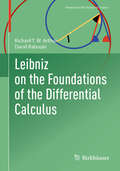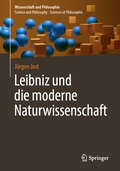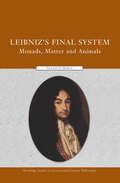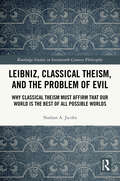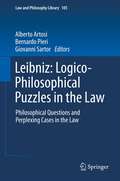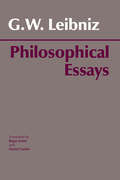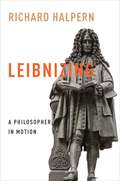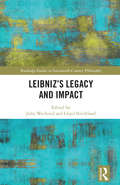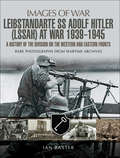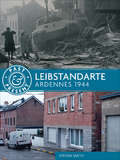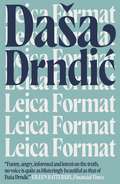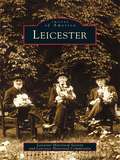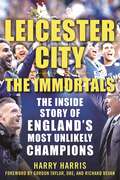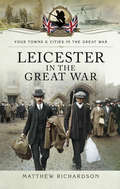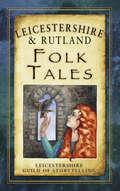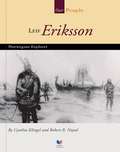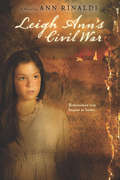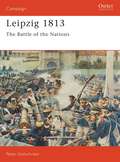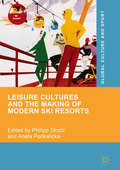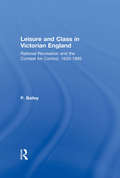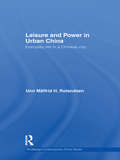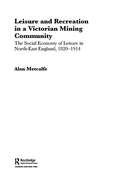- Table View
- List View
Leibniz on the Foundations of the Differential Calculus (Frontiers in the History of Science)
by David Rabouin Richard T. ArthurThis monograph presents an interpretive essay on the foundations of Leibniz’s calculus, accompanied by key texts in English translation. The essay examines Leibniz's evolving views on infinitesimals and infinite numbers, tracing their development from his early metaphysical ideas to his mature justifications of the calculus. Leibniz first proposed treating infinitesimals as fictions in the 1670s, in line with the mathematical practices of his time, where abstract concepts could be used in calculations without implying their existence. By 1676, he rejected their status as quantities, yet continued to refine his arguments on this topic into the 1690s. The essay concludes with an analysis of Leibniz’s defense of his calculus in the early 18th century, showing how his later works naturally extended from earlier insights. This monograph will be a valuable resource for scholars and students of Leibniz and the history of science.
Leibniz und die moderne Naturwissenschaft (Wissenschaft und Philosophie – Science and Philosophy – Sciences et Philosophie)
by Jürgen JostWas hat ein Gelehrter des 17.Jahrhunderts noch für die heutigen Naturwissenschaften zu sagen? Eine ganze Menge, so zeigt sich in diesem Buch. Gottfried Wilhelm Leibniz (1646-1716) war ein Universalgenie, und ihm gelangen bahnbrechende Leistungen in fast allen Gebieten der Wissenschaft, insbesondere in der Philosophie (Relativität von Raum und Zeit), der Mathematik (Infinitesimalrechnung, Determinantentheorie, binäres Zahlsystem, Konstruktion einer Rechenmaschine), der Logik (Prädikaten- und Modallogik, Konzept der möglichen Welten), der Physik (Energieerhaltung und Aktionsprinzip), der Erd- und Menschheitsgeschichte, der Rechtswissenschaft und der Theologie. Diese Leistungen waren aber nicht isoliert, sondern eingebettet in ein umfassendes System, das auf dem Satz vom Widerspruch, dem Satz vom zureichenden Grunde und dem Kontinuitätsprinzip beruhte. Erst durch das Verständnis dieses Systems erschließen sich die Einheit und die Spannweite seines Denkens. Jürgen Jost, der wie nur wenige andere die verschiedenen Wissenschaften überblickt, konfrontiert dieses leibnizsche System mit den Ansätzen, Denkweisen und Ergebnissen der heutigen Naturwissenschaften, insbesondere der Quantenphysik, der Relativitätstheorie und Kosmologie, der modernen Logik, der Evolutionsbiologie und der Hirnforschung. Es zeigt sich, dass das leibnizsche System in vieler Hinsicht noch aktuell ist und sich bewährt, aber auch in manchen Positionen revidiert werden muss. Hieraus ergeben sich neue Einsichten sowohl in das leibnizsche System als auch in die heutigen Naturwissenschaften.
Leibniz's Final System: Monads, Matter, and Animals (Routledge Studies in Seventeenth-Century Philosophy)
by Glenn A. HartzGottfried Wilhelm Leibniz was one of the central figures of seventeenth-century philosophy, and a huge intellectual figure in his age. This book from Glenn A. Hartz (editor of the influential Leibniz Review) is an advanced study of Leibniz's metaphysics. Hartz analyzes a very complicated topic, widely discussed in contemporary commentaries on Leibniz, namely the question of whether Leibniz was a metaphysical idealist, realist, or whether he tried to reconcile both trends in his mature philosophy. Because Leibniz is notoriously unclear about this, much has been written on the subject. In recent years, the debate has centered on whether it is possible to maintain compatibility between the two trends. In this controversial book, Hartz demonstrates that it is not possible to maintain compatibility of idealist and realist views - they must be understood as completely separate theories. As the first major work on realism in Leibniz's metaphysics, this key text will interest international Leibniz scholars, as well as students at the graduate level.
Leibniz, Classical Theism, and the Problem of Evil: Why Classical Theism Must Affirm That Our World is the Best of All Possible Worlds (Routledge Studies in Seventeenth-Century Philosophy)
by Nathan A. JacobsThis volume offers a defense of Leibniz’s theodicy and his infamous claim that our world is the best of all possible worlds. It considers Leibniz’s rationale for “optimism,” examines its roots in ancient and medieval thought, and forwards a novel rereading of Leibniz’s theory of freedom in light of this background, all of which highlights the very real challenges of evading optimism from within the framework of classical theism. Gottfried Leibniz is known for his “theodicy,” or defense of God's Goodness, Wisdom, and Justice despite the realities of evil in our world. This book argues that Leibniz’s optimism is inevitable for proponents of classical theism and even for many not-so-classical theists. The author’s argument is threefold. First, he demonstrates that Leibniz's theodicy is deeply rooted in the classical theist tradition, pagan and Christian, and shows that the philosopher of Leipzig is merely following these commitments to their logical conclusion, a conclusion that long precedes Leibniz. Second, he offers a novel rereading of Leibniz in the light of his philosophical and theological antecedents, a reading that, if correct, dispels ubiquitous but problematic assumptions about Leibniz's case, specifically those about divine and human freedom. Third, he demonstrates the analytic tether that connects classical theism to Leibniz’s conclusion, making his notorious optimism virtually inevitable for proponents of classical theism — and even for not-so-classical theists. This book demonstrates the ways in which Leibniz is relevant to not only classical theists and students of Modern philosophy but also to contemporary philosophers of religion more generally and philosophical theologians who are concerned with the problem of evil. Leibniz, Classical Theism, and the Problem of Evil will appeal to scholars and graduate students interested in Leibniz, philosophy of religion, history of philosophy, philosophical theology, free will, and the problem of evil.
Leibniz: Logico-Philosophical Puzzles in the Law
by Giovanni Sartor Bernardo Pieri Alberto ArtosiThis volume presents two Leibnizian writings, the Specimen of Philosophical Questions Collected from the Law and the Dissertation on Perplexing Cases. These works, originally published in 1664 and 1666, constitute, respectively, Leibniz's thesis for the title of Master of Philosophy and his doctoral dissertation in law. Besides providing evidence of the earliest development of Leibniz's thought and amazing anticipations of his mature views, they present a genuine intellectual interest, for the freshness and originality of Leibniz's reflections on a striking variety of logico-philosophical puzzles drawn from the law. The Specimen addresses puzzling issues resulting from apparent conflicts between law and philosophy (the latter broadly understood as comprising also mathematics, as well as empirical sciences). The Dissertation addresses cases whose solution is puzzling because of the convoluted logical form of legal dispositions and contractual clauses, or because of conflicting priorities between concurring parties. In each case, Leibniz dissects the problems with the greatest ingenuity, disentangling their different aspects, and proposing solutions always reasonable and sometimes surprising. And he does not refrain from peppering his intellectual acrobatics with some humorous comments.
Leibniz: Philosophical Essays
by Roger Ariew Gottfried Wilhelm Leibniz Daniel GarberAlthough Leibniz's writing forms an enormous corpus, no single work stands as a canonical expression of his whole philosophy. In addition, the wide range of Leibniz's work--letters, published papers, and fragments on a variety of philosophical, religious, mathematical, and scientific questions over a fifty-year period--heightens the challenge of preparing an edition of his writings in English translation from the French and Latin.
Leibnizing: A Philosopher in Motion (Columbia Themes in Philosophy, Social Criticism, and the Arts)
by Richard HalpernWhy read Leibniz today? Can we still learn from him and not just about him? This book argues that Leibniz offers a powerful, productive model for transdisciplinary thinking that can push back against the narrowness of the humanities today.Richard Halpern recasts Leibniz as a great writer as well as a great philosopher, demonstrating that his philosophical project cannot be fully understood without taking its literary elements into account. He shows Leibniz to be a prescient thinker about art and beauty whose insights into the relationship between aesthetic experience and thought remain invaluable. Leibnizing asks readers to follow the dynamic movement of Leibniz’s writing instead of attempting to grasp a static philosophical system and to pay careful attention to the rhetorical and stylistic registers of Leibniz’s work as well as its conceptual and logical dimensions.For philosophers, this book offers a novel approach to reading and interpreting Leibniz. For literary and other theorists, it showcases the relevance of Leibniz’s thought to areas from aesthetics to politics and from metaphysics to computer science. Written in a lucid and even witty style, Leibnizing provides readers with an accessible entryway into Leibniz’s sometimes forbidding but ultimately rewarding philosophical vision.
Leibniz’s Legacy and Impact (Routledge Studies in Seventeenth-Century Philosophy)
by Lloyd Strickland Julia WeckendThis volume tells the story of the legacy and impact of the great German polymath Gottfried Wilhelm Leibniz (1646-1716). Leibniz made significant contributions to many areas, including philosophy, mathematics, political and social theory, theology, and various sciences. The essays in this volume explores the effects of Leibniz’s profound insights on subsequent generations of thinkers by tracing the ways in which his ideas have been defended and developed in the three centuries since his death. Each of the 11 essays is concerned with Leibniz’s legacy and impact in a particular area, and between them they show not just the depth of Leibniz’s talents but also the extent to which he shaped the various domains to which he contributed, and in some cases continues to shape them today. With essays written by experts such as Nicholas Jolley, Pauline Phemister, and Philip Beeley, this volume is essential reading not just for students of Leibniz but also for those who wish to understand the game-changing impact made by one of history’s true universal geniuses.
Leibstandarte SS Adolf Hitler: A History of the Division on the Western and Eastern Fronts (Images of War)
by Ian BaxterWith extensive text and many unpublished photographs with in-depth captions - the successful Images of War format - this book describes the Divisions fighting tactics, weapons and uniforms. It traces how the Division became an elite fighting unit both in offensive and defensive battles.The Division is shown as it battled its way through Poland, the Low Countries, the Balkans and then on the Eastern Front, where it fought tenaciously for Kharkov and in the 1943 battle of Kursk. In 1944 it was deployed to Normandy before the carnage of the Falaise Pocket. Soon after it was back in action during the bitter winter fighting in the Ardennes, before returning to the Eastern Front where it was shifted from one disintegrating part of the front to another. The Leibstandarte SS Adolf Hitler (LSSAH) provides a captivating glimpse of the history and inner workings of one of the most effective fighting formations of the Second World War.
Leibstandarte: Ardennes 1944 (Past & Present)
by Stephen Smith Simon FortyThe missions and massacres of the infamous panzer division that spearheaded the German Ardennes Offensive in the Battle of the Bulge.From the outset of the offensive, launched on a snowy December 16, the 1st SS Panzer Division Leibstandarte Adolf Hitler faced difficulties. It captured a fuel dump at Büllingen, but brave defense forced Commander Joachim Peiper onto tight, winding roads that proved difficult to negotiate and soon the battle group was strung out over 25 kilometers with its heavy armor—the King Tigers—slowly losing ground as vehicle after vehicle succumbed to automotive failures. Pushing through Stavelot and Trois Pont, the advanced units of the battle group reached Stoumont before lack of fuel—the Americans had retaken Stavelot and closed off the route for German resupply—and US Army action forced it to halt at La Gleize. Six days later, on Christmas Eve, with no hope and no fuel, Peiper and his men abandoned their vehicles and made their way back to their lines: only 770 got there.They left behind 135 armored vehicles including the King Tiger that today stands in front of the museum at La Gleize. They also left scattered on their route the murdered bodies of US servicemen—at Malmedy, Ligneuville, and Wereth—and civilians, massacres that would lead to postwar trials and continued recriminations.The Past & Present Series reconstructs historical battles by using photography, juxtaposing modern views with those of the past together with concise explanatory text. It shows how much infrastructure has remained and how much such as outfits, uniforms, and ephemera has changed, providing a coherent link between now and then.
Leica Format
by Daša DrndicThis is like a fairy tale, all this. A woman meets a stranger who tells her her identity is a lie. 772 (or 789) children's brains rest silently in jars. A traveller comes to a quotidian city, unknowingly approaching her past. From the author of Trieste (shortlisted for the Independent Foreign Fiction Prize) comes this bedazzling kaleidoscopic novel, stitching together fact and fiction, history and memory, words and images into a heart-breaking collage that manages to look askance at the blinding horror of history. Ranging across themes of memory, loss, inheritance and storytelling, Drndic borrows from every tradition of writing to weave together a fragmented narrative of love and disease, in a novel that's very format raises penetrating and unanswerable questions about history, and the processes by which we describe and remember it.
Leicester
by Leicester Historical Society Leicester Historical CommissionLeicester began as a small Colonial settlement in the early 1700s and quickly blossomed into a flourishing farming community. Located among the headwaters of the Blackstone River, the numerous villages of Leicester prospered during the Industrial Revolution with gristmills, sawmills, and textile mills. By the 1880s, one-third of all hand and machine cards made in North America were produced in Leicester. After the deindustrialization of the twentieth century, the town began to return to its agricultural roots; today, for the most part, it appears largely rural once again. Leicester pays tribute to the industrial, yet rural, and independent, yet cooperative, spirit of this suburb of Worcester.
Leicester City: The Inside Story of England's Most Unlikely Champions
by Gordon Taylor Harry Harris Richard BevanThe Immortals is the fairy-tale account of Leicester City, who rose from the very bottom of the English Premier League-the world’s toughest soccer league-to triumph against all odds (5,000-1) and finish as champions.Ending up in League One (third level) for the first time in 2008-09, the team stormed through the season to win the league and was promoted back up to the League Championship (second league). After four seasons as a middle-of-the-pack team, Leicester won the league in 2013-14, being promoted to the EPL for the first time in a decade. After a strong start the following season, the team quickly faded and looked to be facing relegation. But after winning seven out of their last nine games, they avoided the demotion and finished in fourteenth place.Under the calm and wise management of Claudio Ranieri-who was named as manager to start the 2015-16 season-the East Midlands club stunned football supporters by winning despite not having a recognizable superstar on the team.With massive team spirit and a never-say-die attitude, the team kept Tottenham, Arsenal, and Manchester City at bay to secure their first ever Premier League trophy in their 132-year history. In the process, journeyman players such as Jamie Vardy, Riyad Mahrez, N’Golo Kante, and Kasper Schmeichel became household names and added to the team’s growing lore.Written by legendary soccer writer Harry Harris, with seventy-six books to his name, The Immortals is a must-read for all fans of the sport, as well as those who adopted Leicester City and the Foxes during their dramatic run.
Leicester in the Great War (Your Towns & Cities in the Great War)
by Matthew RichardsonLeicester had a strong radical tradition, and was represented in Parliament during the Great War by the outspoken Labour MP Ramsay MacDonald. MacDonald's anti-war views divided opinion in Leicester sharply, but whilst it was slow to provide troops for Kitchener's Army, this was not through lack of patriotism. Instead, Leicester's three main industries footwear, hosiery and engineering all had bulging order books as a result of government war contracts.Bravery on the battlefield, strikes at home, conscientious objectors and the great flu pandemic were all part of Leicester's story in the Great War, and all are covered here. The author allows Leicester citizens, who lived through these momentous events, to tell their stories in their own words, and powerful eyewitness accounts from men, women and children run through this book. Many of these accounts are previously unpublished, and lend a sense of freshness and immediacy to the narrative, making this an ideal purchase for First World War enthusiasts and social historians alike.
Leicestershire and Rutland Folk Tales
by Leicestershire Guild of StorytellingThese lively and entertaining folk tales from one of Britain's most ancient counties are vividly retold by Leicestershire Guild of Storytelling. Their origins lost in the oral tradition, these thirty stories from Leicestershire and Rutland reflect the wisdom (and eccentricities) of the counties and its people. Leicestershire and Rutland have a rich and diverse collection of tales, from stories of epic battles and heroic deeds to legends of mythical creatures and ghostly goings-on. These stories, illustrated with twenty-five line drawings, bring alive the landscape of the counties’ rolling hills and fertile plains. Leicestershire Guild of Storytelling is a group of professional storytellers who have been collecting and telling traditional stories for fifteen years. They regularly organise festivals and storytelling events.
Leif Eriksson: Norwegian Explorer
by Cynthia Klingel Robert B. Noyed Cynthia Fitterer KlingelA biography of Leif Eriksson: Norwegian Explorer
Leif The Lucky
by Ingri Daulaire Edgar P. DaulaireA biography of Leif Erickson, son of Eric the Red,a famous Viking and early visitor to North America.
Leigh Ann's Civil War
by Ann RinaldiRecounts the experiences of a spunky young girl, just eleven when the Civil War breaks out as she watches her brothers go to war, helps care for her mentally ill father, and falls in love with a boy determined to be a soldier.
Leigh Ann's Civil War: A Novel (Great Episodes)
by Ann RinaldiLeigh Ann Conners is spunky and determined. Although she often finds herself in trouble, she loves her two older brothers dearly and would do anything to make them proud. When the Yankees arrive in Roswell, Georgia, Leigh Ann places a French flag upon the family’s mill. She hopes the Yankees will then spare the mill from destruction, but her actions have disastrous results. Sent north with the women and children who worked in the mill—all branded traitors for making fabric for Confederate uniforms—Leigh Ann embarks on a journey that requires her to find her own inner strength. Only then will she be able to rise above the war raging around her.
Leila
by Robin JenkinsA Scotsman in 1950s Asia becomes entangled in love and political unrest: &“As a storyteller, Jenkins has few equals.&” —Tribune Set in the Far East in the 1950s, Leila is a tender love story involving a Scottish teacher, Andrew Sandilands, and Leila, the exotically beautiful daughter of a local politician. Leila is, like her father, implicated in the revolutionary tremors shaking the small country, and the lovers are soon torn between the small-minded mores of the expatriate community and Leila&’s determined efforts to play a role in her country&’s future. The masked oppression of the regime forms the backdrop to a novel where personal dramas collide with the legacies of colonialism, in this absorbing novel from the prize-winning author of The Cone Gatherers. &“A remarkable writer.&” —The Times
Leipzig 1813
by Peter HofschröerThe battle of Leipzig was, in terms of the number of combatants involved, the largest engagement of the entire Napoleonic Wars (1799-1815). It was the only battle of the wars in which all Allied armies (including even the Swedes) fielded troops against Napoleon. Peter Hofschroer looks at the run-up to this crucial encounter as well as the battle itself. A wealth of background information is chronicled, including the strategies of both sides and detailed information on each of the combatant forces. The numerous battles leading up to Leipzig are also discussed, providing a fascinating and illuminating overview of the whole campaign.
Leisure Cultures and the Making of Modern Ski Resorts (Global Culture and Sport Series)
by Philipp Strobl Aneta PodkalickaThis edited volume offers an historical perspective on the creation of a global mass industry around skiing. By focusing on the ski resort as loci par excellence for global exchange, the contributors consider the development of skiing around the world during the crucial post-war years. With its global lens, Leisure Cultures and the Making of Modern Ski Resorts highlights both commonalities and differences between countries. Experts across various fields of research cover developments across the ski-able world, from Europe, Asia and America to Australia. Attention to media and material cultures reveals an insight into global fashions, consumption and ski cultures, and the impact of mainstream media in the 1960s and 1970s. This global and interdisciplinary approach will appeal to history, sociology, cultural and media research scholars interested in a cultural history of skiing, as well as those with more broad interests in globalization, consumption research, and knowledge transfer.
Leisure and Class in Victorian England: Rational recreation and the contest for control, 1830-1885
by Peter BaileyFirst published in 2006. Routledge is an imprint of Taylor & Francis, an informa company.
Leisure and Power in Urban China: Everyday life in a Chinese city (Routledge Contemporary China Series)
by Unn Målfrid RolandsenLeisure and Power in Urban China is the first comprehensive study of leisure activities in a medium size Chinese city. Hitherto, studies of Chinese leisure have focused on holidays, festivals and tourism. This, however, is a study of the kinds of leisure that take place on regular workdays in a local environment of Quanzhou city. In doing so, Leisure and Power introduces leisure studies to China studies, and data from China to the field of Leisure studies. Based on interviews with people from all walks of life and case studies from bookshops, internet bars, Karaoke parlours, streets and public squares, Rolandsen brings to attention the importance of fun and socializing in the lives of Chinese urbanites. Central to the study is the contrast between popular practices and official discourse. Rolandsen provides in-depth analyses of the moralist "PRC leisure ethic" so characteristic of official Chinese publications and news media. Using examples from everyday life as a contrast, this study demonstrates that official propaganda has but little influence on how Chinese individuals lead their lives. Taking leisure as a point of departure, this book describes the new kinds of interaction between the local party-state and the population it seeks to govern. This book will be of interest to students and scholars of Chinese Studies, Leisure Studies, Urban Studies and Asian Studies in general.
Leisure and Recreation in a Victorian Mining Community: The Social Economy of Leisure in North-East England, 1820 – 1914 (Sport in the Global Society)
by Alan Metcalfe'Amusements they must have, or life would hardly be worth living...' Newcastle Weekly Chronicle, 1895 This text explores life in the mining villages of the north-east of England in the nineteenth and early twentieth centuries - a time of massive social and industrial change. The sporting lives of these communities are often marginalized by historians, but this thoroughly researched account reveals how play as well as work were central to the lives of the working classes. Miners contributed significantly to the economic success of the north-east during this time, yet living conditions in the mining villages were 'horrendous'. Sport and recreation were essential to bring meaning and pleasure to mining families, and were fundamental to the complex social relationships within and between communities. Features of this extensive text include: * analysis of the physical, social and economic structures that determined the leisure lives of the mining villages* the role of 'traditional' and 'new' sports* comparisons with other British regions.
